
9 Jul 2024
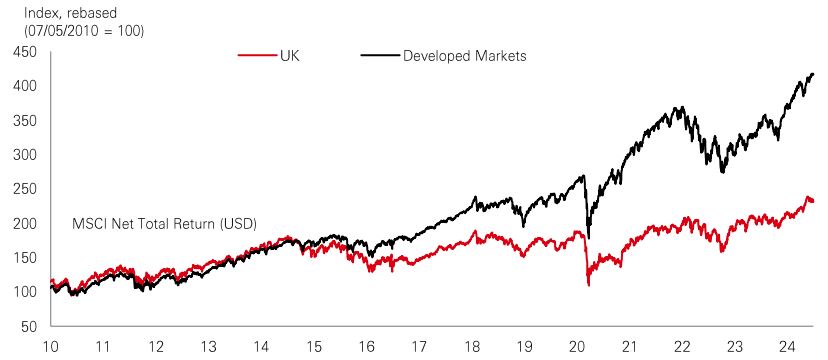
Last week’s victory by the Labour Party in the UK general election marks the end of an era in British politics after 14 years of Conservative rule. During that time, investors have navigated a series of big macroeconomic and political events such as post financial-crisis austerity and eurozone turmoil, Brexit, the Covid pandemic and Russia’s invasion of Ukraine. Through the twists and turns in the market, investors in UK equities have done reasonably well, with a net total return of 130% for the MSCI UK in dollar terms, even if this pales into comparison versus gains in overall developed market stocks.
What next for the UK stock market? The Labour Party will face a daunting task in its attempts to boost UK growth and productivity. Like elsewhere in the western world, public finances are stretched after the pandemic and 2022 energy shock, constraining public investment and demand-stimulus measures. Bond market investors are watching closely. And services inflation remains a bit sticky – perhaps due to structural issues such as long-term sickness.
Also, like European markets, the UK is a value play, an investment style that has not fared well over the past 18 months – growth and tech stocks remain en vogue. But as global profits broaden out and the UK economy recovers from last year’s slump, there may be a reversal in fortunes. UK big caps can also benefit from a backdrop of resilient global growth. And crucially, valuations matter for the longer run.
India’s sovereign bonds finally joined the widely-tracked GBI-EM Global Diversified Index in the previous week. They will be phased in over the next 10 months, eventually achieving a maximum weight of 10%. It’s an important move for both India’s bonds and the rupee because it is likely to boost long-term capital flows.
It comes at a time when the country’s external balance is in good shape, with an improving current account that was largely in balance at the end of Q1. But it wasn’t always like this. Five years ago, India’s FX reserves relied mainly on portfolio inflows, and persistent current account deficits meant its net external position was often on the backfoot. It meant the Reserve Bank of India spent a lot of time building FX reserves to defend the rupee against market volatility. More recently, India has been successfully building ‘good quality’ reserves. And its external vulnerabilities have been declining too.
The value of investments and any income from them can go down as well as up and investors may not get back the amount originally invested. Past performance does not predict future returns. The level of yield is not guaranteed and may rise or fall in the future.
This information shouldn't be considered as a recommendation to buy or sell specific sector/stocks mentioned. Any views expressed were held at the time of preparation and are subject to change without notice. While any forecast, projection or target where provided is indicative only and not guaranteed in any way.
Source: HSBC Asset Management. Macrobond, Bloomberg. Data as at 11.00am UK time 05 July 2024.
The French election has put the country’s public finances back on investors’ radar. Mooted policy proposals among challenger parties could mean fiscal loosening that would raise an already uncomfortably high debt burden. France is not alone in facing rising policy uncertainty against a backdrop of undesirable debt dynamics. The US goes to the polls later this year, while there is still some uncertainty surrounding the new UK government’s fiscal plans.
Meanwhile, although Italy is not facing an election, it too stands out as having general government gross debt exceeding 100% of GDP which, according to the IMF, is expected to rise further over the remainder of the decade.
But what of other developed economies? Typically, they either have lower debt ratios or are forecast to see debt decline – many have both characteristics. This highlights that taking account of country-specific dynamics could play an increasingly important role in the higher interest rate environment. It also emphasises the need for a diversified investment approach.
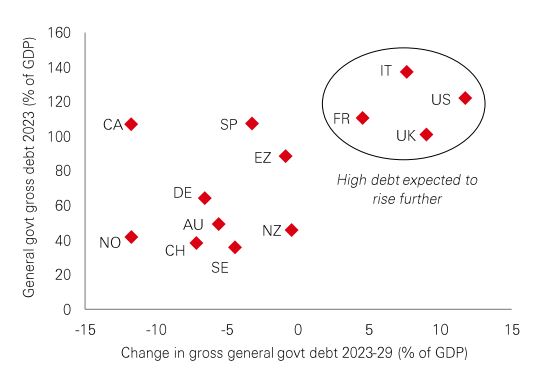
Higher rates in recent years have been tough on alternative asset classes like listed real estate and infrastructure. But with inflation easing, and central banks pivoting, there are signs that valuations will bottom out in 2024 – with activity and returns in both sectors poised for a pick-up.
In listed real estate (REITs), elevated rates have driven down property values and caused investment activity to slow, in part because of the higher costs of debt funding. Likewise, listed companies that develop, or invest in, major infrastructure projects have suffered. That’s despite the sector benefiting from exposure to significant government spending in areas like energy transition.
But with both sectors trading well below their published net asset values (NAVs), a valuation gap relative to global stocks has opened up. Some alternative asset class specialists believe this could offer an attractive entry point for investors. Importantly, real estate and infrastructure can play a useful diversifying role in portfolios, offering defensive traits, inflation protection, and potentially attractive yields – but careful stock and sector selection are key.
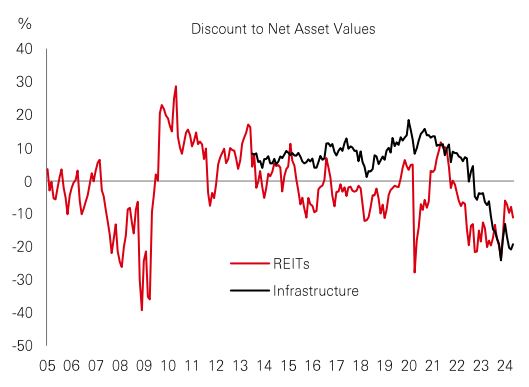
It has been hard to disentangle economics from geopolitics in 2024, with signs that the world is becoming increasingly multipolar. One area we see this in evidence, is in global trade barriers and other protectionist walls, which are being thrown up at a remarkable rate. Data shows a surge over the past few years in trade-distorting measures – so-called ‘harmful’ trade interventions – such as tariffs and export bans.
This shift away from trade integration towards protectionism is fuelled in part by geopolitical and national security concerns. But it’s also down to strategic competitiveness and underscores a wider move towards ‘slowbalisation’. While there can be advantages, it’s a trend that risks raising costs, disrupting trade, and restricting market access. And for investors, that raises uncertainty.
More broadly, we see a risk that trade interventions are one of a number of geopolitical events that could start to ‘stack up’ and affect the economic outlook. For investors, it could pay to be prepared for policy, political and geopolitical uncertainties that makes for a bumpier ride in markets in the second half of the year.
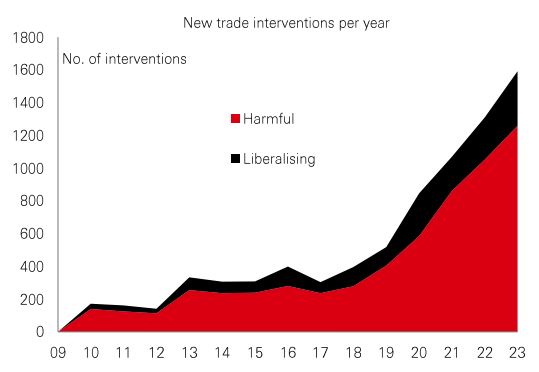
Past performance does not predict future returns.
Source: HSBC Asset Management. Macrobond, Bloomberg. Data as at 11.00am UK time 05 July 2024.
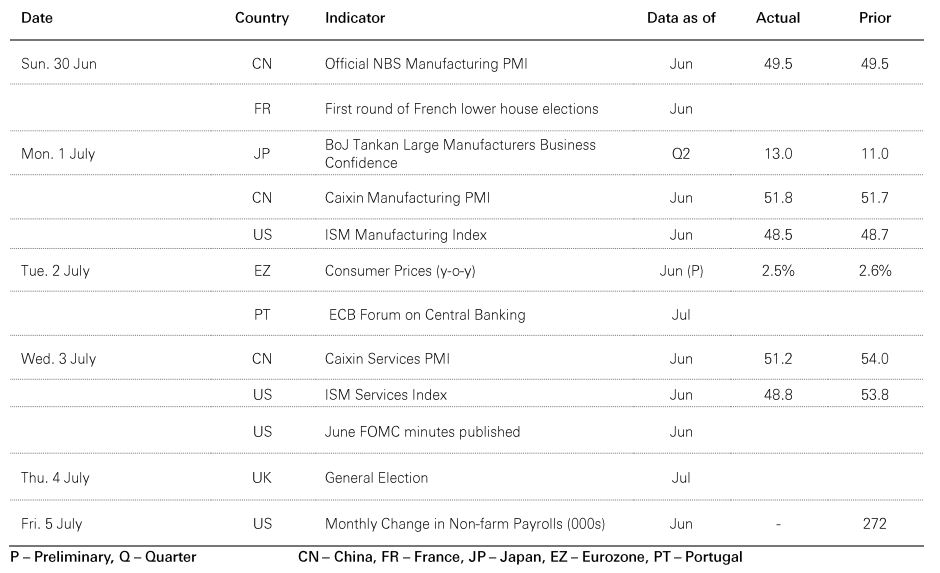
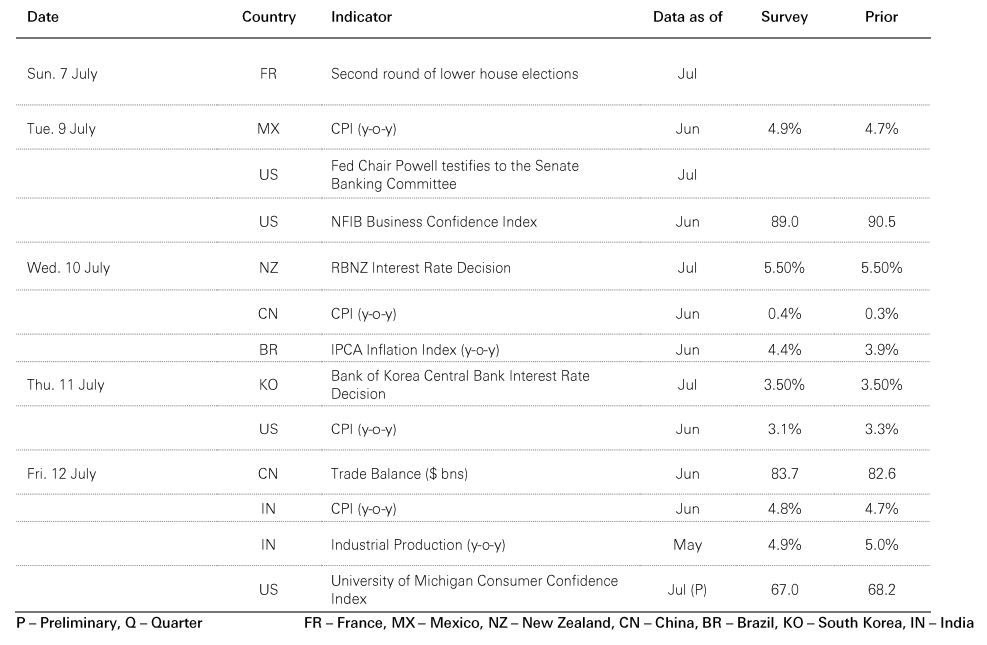
Source: HSBC Asset Management. Data as at 11.00am UK time 09 July 2024. The views expressed above were held at the time of preparation and are subject to change without notice.
Dovish comments from Fed Chair Powell boosted risk markets. Core government bonds were range-bound as investors mulled uncertainty over the upcoming Presidential election and weak US data. US equities were mixed: the S&P500 reached an all-time high but the Russell 2000 lost ground. The Euro Stoxx 50 index rebounded, led by French equities. The spread between 10yr French and German bonds narrowed ahead of the second round of lower house elections in France. Japan’s Nikkei 225 reached record levels, aided by the yen’s continued weakness against the US dollar. EMs saw a mixed performance, with China’s Shanghai Composite index weakening on lingering growth concerns. India’s Sensex index moved higher, while Brazil’s Bovespa index rose on better fiscal news. In commodities, oil prices rose on improving summer demand. Gold consolidated, while copper was steady.





This document or video is prepared by The Hongkong and Shanghai Banking Corporation Limited (‘HBAP’), 1 Queen’s Road Central, Hong Kong. HBAP is incorporated in Hong Kong and is part of the HSBC Group. This document or video is distributed and/or made available, HSBC Bank (China) Company Limited, HSBC Bank (Singapore) Limited, HSBC Bank Middle East Limited (UAE), HSBC UK Bank Plc, HSBC Bank Malaysia Berhad (198401015221 (127776-V))/HSBC Amanah Malaysia Berhad (20080100642 1 (807705-X)), HSBC Bank (Taiwan) Limited, HSBC Bank plc, Jersey Branch, HSBC Bank plc, Guernsey Branch, HSBC Bank plc in the Isle of Man, HSBC Continental Europe, Greece, The Hongkong and Shanghai Banking Corporation Limited, India (HSBC India), HSBC Bank (Vietnam) Limited, PT Bank HSBC Indonesia (HBID), HSBC Bank (Uruguay) S.A. (HSBC Uruguay is authorised and oversought by Banco Central del Uruguay), HBAP Sri Lanka Branch, The Hongkong and Shanghai Banking Corporation Limited – Philippine Branch, HSBC Investment and Insurance Brokerage, Philippines Inc, and HSBC FinTech Services (Shanghai) Company Limited and HSBC Mexico, S.A. Multiple Banking Institution HSBC Financial Group (collectively, the “Distributors”) to their respective clients. This document or video is for general circulation and information purposes only.
The contents of this document or video may not be reproduced or further distributed to any person or entity, whether in whole or in part, for any purpose. This document or video must not be distributed in any jurisdiction where its distribution is unlawful. All non-authorised reproduction or use of this document or video will be the responsibility of the user and may lead to legal proceedings. The material contained in this document or video is for general information purposes only and does not constitute investment research or advice or a recommendation to buy or sell investments. Some of the statements contained in this document or video may be considered forward looking statements which provide current expectations or forecasts of future events. Such forward looking statements are not guarantees of future performance or events and involve risks and uncertainties. Actual results may differ materially from those described in such forward-looking statements as a result of various factors. HBAP and the Distributors do not undertake any obligation to update the forward-looking statements contained herein, or to update the reasons why actual results could differ from those projected in the forward-looking statements. This document or video has no contractual value and is not by any means intended as a solicitation, nor a recommendation for the purchase or sale of any financial instrument in any jurisdiction in which such an offer is not lawful. The views and opinions expressed are based on the HSBC Global Investment Committee at the time of preparation and are subject to change at any time. These views may not necessarily indicate HSBC Asset Management‘s current portfolios’ composition. Individual portfolios managed by HSBC Asset Management primarily reflect individual clients’ objectives, risk preferences, time horizon, and market liquidity.
The value of investments and the income from them can go down as well as up and investors may not get back the amount originally invested. Past performance contained in this document or video is not a reliable indicator of future performance whilst any forecasts, projections and simulations contained herein should not be relied upon as an indication of future results. Where overseas investments are held the rate of currency exchange may cause the value of such investments to go down as well as up. Investments in emerging markets are by their nature higher risk and potentially more volatile than those inherent in some established markets. Economies in emerging markets generally are heavily dependent upon international trade and, accordingly, have been and may continue to be affected adversely by trade barriers, exchange controls, managed adjustments in relative currency values and other protectionist measures imposed or negotiated by the countries with which they trade. These economies also have been and may continue to be affected adversely by economic conditions in the countries in which they trade. Investments are subject to market risks, read all investment related documents carefully.
This document or video provides a high-level overview of the recent economic environment and has been prepared for information purposes only. The views presented are those of HBAP and are based on HBAP’s global views and may not necessarily align with the Distributors’ local views. It has not been prepared in accordance with legal requirements designed to promote the independence of investment research and is not subject to any prohibition on dealing ahead of its dissemination. It is not intended to provide and should not be relied on for accounting, legal or tax advice. Before you make any investment decision, you may wish to consult an independent financial adviser. In the event that you choose not to seek advice from a financial adviser, you should carefully consider whether the investment product is suitable for you. You are advised to obtain appropriate professional advice where necessary.
The accuracy and/or completeness of any third-party information obtained from sources which we believe to be reliable might have not been independently verified, hence Customer must seek from several sources prior to making investment decision.
The following statement is only applicable to HSBC Mexico, S.A. Multiple Banking Institution HSBC Financial Group with regard to how the publication is distributed to its customers: This publication is distributed by Wealth Insights of HSBC México, and its objective is for informational purposes only and should not be interpreted as an offer or invitation to buy or sell any security related to financial instruments, investments or other financial product. This communication is not intended to contain an exhaustive description of the considerations that may be important in making a decision to make any change and/or modification to any product, and what is contained or reflected in this report does not constitute, and is not intended to constitute, nor should it be construed as advice, investment advice or a recommendation, offer or solicitation to buy or sell any service, product, security, merchandise, currency or any other asset.
Receiving parties should not consider this document as a substitute for their own judgment. The past performance of the securities or financial instruments mentioned herein is not necessarily indicative of future results. All information, as well as prices indicated, are subject to change without prior notice; Wealth Insights of HSBC Mexico is not obliged to update or keep it current or to give any notification in the event that the information presented here undergoes any update or change. The securities and investment products described herein may not be suitable for sale in all jurisdictions or may not be suitable for some categories of investors.
The information contained in this communication is derived from a variety of sources deemed reliable; however, its accuracy or completeness cannot be guaranteed. HSBC México will not be responsible for any loss or damage of any kind that may arise from transmission errors, inaccuracies, omissions, changes in market factors or conditions, or any other circumstance beyond the control of HSBC. Different HSBC legal entities may carry out distribution of Wealth Insights internationally in accordance with local regulatory requirements.
Important Information about the Hongkong and Shanghai Banking Corporation Limited, India (“HSBC India”)
HSBC India is a branch of The Hongkong and Shanghai Banking Corporation Limited. HSBC India is a distributor of mutual funds and referrer of investment products from third party entities registered and regulated in India. HSBC India does not distribute investment products to those persons who are either the citizens or residents of United States of America (USA), Canada, Australia or New Zealand or any other jurisdiction where such distribution would be contrary to law or regulation.
The following statement is only applicable to HSBC Bank (Taiwan) Limited with regard to how the publication is distributed to its customers: HSBC Bank (Taiwan) Limited (“the Bank”) shall fulfill the fiduciary duty act as a reasonable person once in exercising offering/conducting ordinary care in offering trust services/ business. However, the Bank disclaims any guarantee on the management or operation performance of the trust business.
The following statement is only applicable to PT Bank HSBC Indonesia (“HBID”): PT Bank HSBC Indonesia (“HBID”) is licensed and supervised by Indonesia Financial Services Authority (“OJK”). Customer must understand that historical performance does not guarantee future performance. Investment product that are offered in HBID is third party products, HBID is a selling agent for third party product such as Mutual Fund and Bonds. HBID and HSBC Group (HSBC Holdings Plc and its subsidiaries and associates company or any of its branches) does not guarantee the underlying investment, principal or return on customer investment. Investment in Mutual Funds and Bonds is not covered by the deposit insurance program of the Indonesian Deposit Insurance Corporation (LPS).
Important information on ESG and sustainable investing
Today we finance a number of industries that significantly contribute to greenhouse gas emissions. We have a strategy to help our customers to reduce their emissions and to reduce our own. For more information visit www.hsbc.com/sustainability.
In broad terms “ESG and sustainable investing” products include investment approaches or instruments which consider environmental, social, governance and/or other sustainability factors to varying degrees. Certain instruments we classify as sustainable may be in the process of changing to deliver sustainability outcomes. There is no guarantee that ESG and Sustainable investing products will produce returns similar to those which don’t consider these factors. ESG and Sustainable investing products may diverge from traditional market benchmarks. In addition, there is no standard definition of, or measurement criteria for, ESG and Sustainable investing or the impact of ESG and Sustainable investing products. ESG and Sustainable investing and related impact measurement criteria are (a) highly subjective and (b) may vary significantly across and within sectors.
HSBC may rely on measurement criteria devised and reported by third party providers or issuers. HSBC does not always conduct its own specific due diligence in relation to measurement criteria. There is no guarantee: (a) that the nature of the ESG / sustainability impact or measurement criteria of an investment will be aligned with any particular investor’s sustainability goals; or (b) that the stated level or target level of ESG / sustainability impact will be achieved. ESG and Sustainable investing is an evolving area and new regulations are being developed which will affect how investments can be categorised or labelled. An investment which is considered to fulfil sustainable criteria today may not meet those criteria at some point in the future.
THE CONTENTS OF THIS DOCUMENT OR VIDEO HAVE NOT BEEN REVIEWED BY ANY REGULATORY AUTHORITY IN HONG KONG OR ANY OTHER JURISDICTION. YOU ARE ADVISED TO EXERCISE CAUTION IN RELATION TO THE INVESTMENT AND THIS DOCUMENT OR VIDEO. IF YOU ARE IN DOUBT ABOUT ANY OF THE CONTENTS OF THIS DOCUMENT OR VIDEO, YOU SHOULD OBTAIN INDEPENDENT PROFESSIONAL ADVICE.
© Copyright 2024. The Hongkong and Shanghai Banking Corporation Limited, ALL RIGHTS RESERVED.
No part of this document or video may be reproduced, stored in a retrieval system, or transmitted, on any form or by any means, electronic, mechanical, photocopying, recording or otherwise, without the prior written permission of The Hongkong and Shanghai Banking Corporation Limited.